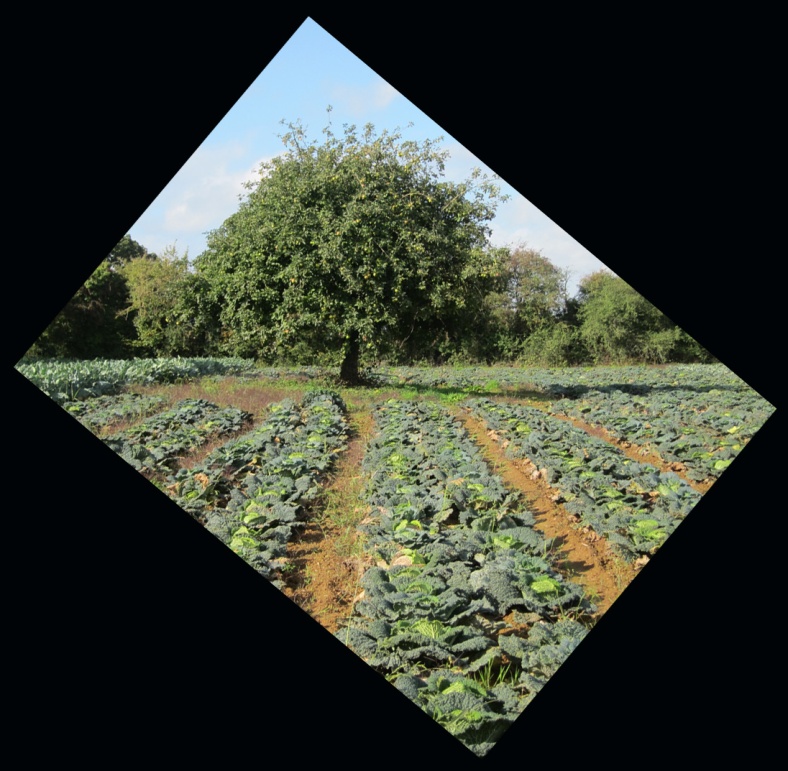Over the past year, I have had the opportunity to get to know a vegetable farmer and regularly spend time on the farm he runs with his brother. You can imagine that there are some great perks to be found in such a relationship. Some were evident to me from the start, but others are only now emerging.
My fridge is most often packed with the freshest of seasonal vegetables, inciting me to create menus using what’s being grown here, now. My tummy is well-fed, never going hungry for long. My eyes, too, are treated to daily feasts: the dramatic magenta and lime-green paint splash inside a watermelon radish; the geometric zigzags of a bouquet of fresh arugala; the Southwestern palette formed by so many winter squash varieties side by side; the pure, delicate, creamy white of a young cauliflower framed by a regal fringe of leaves.
Then there is the satisfaction of connecting the final product with moments from its life, and mine: a 20-pound bag of potatoes evokes the exhausting pleasure of digging in the earth for treasures … a juicy, ripe tomato smells of sweat and embraces in a hot, dusty greenhouse … a turnip gives me a shiver, as I recall hours spent kneeling in a muddy field under December rain showers, slicing off unwanted root tips and greens.
Plenty of other less easily-classifiable pleasures also arise during my visits to the farm. Approaching a field of abandoned cabbages, a smile forms on my lips. The afterlife of these vegetables is nothing other than sculptural: small lone trees – no two identical – line up in far-reaching rows, their top-heavy profiles silhouetted by the practically horizontal rays of a blazing morning sun. Witnessing a field of pumpkins grow from seed to pregnant orange Octoberness, from one visit to the next, has the magical effect of time-lapse photography.
And there is more. On the farm, there is plentiful work to be done. Some of it is administrative, some is meticulous, some is interpersonal, but the vast majority of the work to be done is physical labor, often using repetitive motions. Added to the heaviness of the tasks are weather conditions, which are often less than ideal, but must nevertheless be worked with. Deadlines for deliveries or markets provide the general guidelines for the week, but the hours that make up each day center around vegetables, and the earth, neither of which can be hurried.
Indeed, I have come to observe that hurrying, scurrying, skipping over important steps, and working in a frenzied, scattered manner (all of which I am afraid I’m too well acquainted with) are simply antithetical to this workplace. To get through the week – not to mention the year – in one piece, a farmer must pace himself. There’s no sense tiring yourself out by running to the farthermost field, only to arrive, get on your hands and knees and proceed to harvest radishes for the next three hours. Plus, you might slip in the muddy tractor ruts and end up face-down in a wet, brown, stinking puddle. So instead you walk to the field, not dawdling but not sprinting either. And as you crawl along the rows of root vegetables, you don’t bulldoze through. Slowing down is essential, so as not to miss any harvestable vegetables, not to plant your knee on a pointy rock, and not to tire yourself out before you’re even half-way through. And when you climb into the driver’s seat of the big red tractor, you sign an invisible contract, agreeing to let go of speed altogether, in exchange for the extreme usefulness of all-terrain traction power. One false move and you’re no longer straddling rows of thriving seedlings, you’re crushing them.
I don’t mean to give you the idea that these guys work at a snail’s pace. Many miles are covered each week from field to office to greenhouse to barn and back to the field. Untold pounds are hoisted from soil to tractor to barn to washing station to weighing station to crate to truck to market. Countless tasks are completed each day.
But there is an inherent order to things, as well as the necessity to proceed at a reasonable, yet sustained tempo. And this, I find truly delightful. One task at a time. Few distractions. An unspoken requirement to pace yourself in favor of consistent, quality work while preserving your physical self. The challenges and the pleasures of working outdoors, in close contact with life in its different stages. A different kind of tiredness when you fall into bed at night — your body begs for regeneration but your mind is lighter, clearer, aired out.
I may not be cut out to be a farmer. My body might never be hardy enough. But just being there from time to time is enough to open my eyes to this utterly different world, a world that tends to remain invisible, hiding behind our bowls of salad, our crudité platters, our curries, our stir-fries, our crocks of soup. There are people back there, crawling down endless rows of rutabaga in gusts of wind and rain, not appearing to be accomplishing that much, but I assure you, they are filling the crates, and our bellies, slowly but surely.
